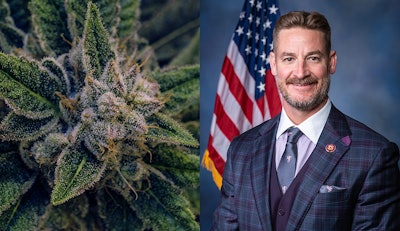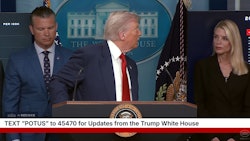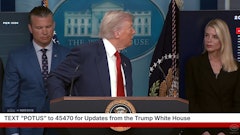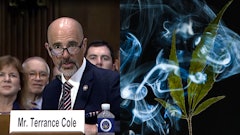
As President Donald Trump weighs executive action over the “next few weeks” to potentially reschedule cannabis, a Republican U.S. congressman announced Aug. 11 that he plans to take legislative action.
U.S. House Rep. Greg Steube, R-Fla., pledged to reintroduce his Marijuana 1-to-3 Act this week to reclassify cannabis from a Schedule I to Schedule III drug under the Controlled Substances Act.
Steube announced his intentions on social media following Trump’s first public comments on cannabis policy since taking office nearly eight months ago. The president said that while “some people like it” and “some people hate the whole concept” of cannabis, his administration plans to determine whether the plant should be rescheduled “over the next few weeks.”
RELATED: Trump Publicly Addresses Cannabis Rescheduling: Decision Coming in ‘Next Few Weeks’
The executive branch’s rescheduling plot has been ongoing since President Joe Biden asked his administration in October 2022 to initiate an administrative process to review how cannabis is scheduled under federal law. As a Schedule I controlled substance, cannabis is in the same company as heroin, LSD and ecstasy, with no “currently accepted medical use.”
Steube, who has filed the Marijuana 1-to-3 Act in the past three congresses, plans to renew his legislative branch push this week.
“It makes zero sense that federal law treats marijuana the same as heroin and LSD,” he wrote on X. “It is even more ridiculous that cocaine is technically classified as less restrictive than marijuana.”
Cocaine is listed under Schedule II, alongside fentanyl, OxyContin, Vicodin, Adderall, Ritalin and other drugs considered to have medical value.
“This week, I’m reintroducing my Marijuana 1-to-3 Act to move marijuana from Schedule I to Schedule III under the Controlled Substances Act,” Steube said. “This is a common-sense change that will finally allow real scientific research into its medicinal value and ensure our drug laws reflect reality. I urge my colleagues and the Trump administration to get it done.”
While cannabis would remain criminalized under a Schedule III status, penalties related to manufacturing, distributing and possessing could be less severe; however, drug trafficking penalties related to cannabis are often discretionary in the judicial system, and vary from state to state.
Also, while researching Schedule III substances often involves less-burdensome requirements by the Drug Enforcement Administration (DEA) compared to Schedule I substances, the notion that moving cannabis to Schedule III would unlock research opportunities is a false narrative, according to legal experts.
When Biden signed the bipartisan Medical Marijuana and Cannabidiol Research Expansion Act in December 2022, the legislative intent was to facilitate cannabis research as a Schedule I drug through streamlining the DEA registration process and removing U.S. Food and Drug Administration barriers.
However, by creating separate requirements for cannabis researchers and manufacturers, the act may have unintentionally cemented certain Schedule I research barriers into place if cannabis is reclassified to a Schedule III substance, according to the nonpartisan Congressional Research Service (CRS).
While demand for research could grow with less stigma tied to a Schedule III listing, many restrictions will remain in place, including a barrier for researchers to source high-THC cannabis from state-licensed cultivators.
Jason Adelstone, an attorney at Harris Sliwoski LLP, shares the CRS viewpoint.
“One of the most commonly touted benefits of moving marijuana to Schedule III is that it will bust open research restrictions,” he wrote on July 28. “Unfortunately, due to existing legislation—specifically the Medical Marijuana and Cannabidiol Research Expansion Act (research act)—this benefit is largely illusory.”
In defining cannabis separately from its schedule, the research act codified Schedule I-level restrictions on cannabis manufacturing and research, regardless of its schedule status, according to Adelstone.
However, the appetite for state-level and university-led research could improve under Schedule III’s less restrictive perception, Adelstone wrote.
When Steube introduced his previous iteration of the Marijuana 1-to-3 Act in January 2023, he said one of the main benefits of the legislation would be to allow researchers to access federal funds to determine the plant’s medical value. However, there was no specific language in the two-page bill related to providing these federal funds or any mention of research in general.
In addition to ongoing limitations on federal research, reclassifying cannabis to Schedule III won’t be a silver bullet for banking access, interstate commerce or market access. Separate congressional actions, like the SAFE Banking Act, would be needed.
One of the most impactful benefits of moving cannabis to Schedule III involves removing Section 280E tax barriers in the Internal Revenue Code for state-sanctioned cannabis businesses. Tied to a Schedule I listing, these businesses are barred from deducting ordinary business expenses, from payroll to rent and utilities.
Another Schedule III perk would be removing certain marketing violations for businesses, which, under federal 21 U.S.C. §843(c), cannot advertise in newspapers, magazines or other publications under a Schedule I status. However, state-by-state marketing and advertising regulations vary.
Still, the continuing unknowns of one presidential administration’s enforcement policies to the next present cannabis businesses, states and citizens with unwavering uncertainties. But with 40 states legalizing medical cannabis since 1996 and 24 states legalizing adult-use cannabis since 2012, the federal government represents a late arrival on the scene.
“It’s a very complicated subject—the subject of marijuana,” Trump said during an Aug. 11 White House press conference, while mentioning his administration’s upcoming cannabis rescheduling decision. “That determination hopefully will be the right one.”



























